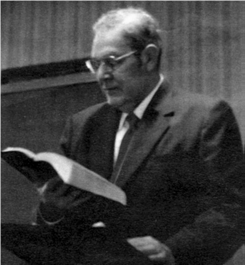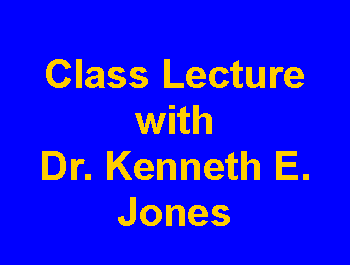


|
General and Special Revelation
Special revelation is that which is made in Christ, and in the Bible, which is “insripturated revelation” of God in Christ Jesus. In addition to the “revealed truth” given in the Scriptures, and organized in the structure of dogmatic theology, there is another source of the knowledge of God — man’s natural reason.
Natural theology, as distinct from revealed theology, consists of those truths which can be discovered by the unaided powers of human reason. This kind of knowledge is accessible to pagans as well as to Christians.
Aristotle, for example, was a great master of this type of knowledge of God. But this natural knowledge of God does not give to man all he needs to know. It is not SAVING KNOWLEDGE. It cannot satisfy the craving of the human soul for something beyond the scope and reach of human mind.
“The full Christian knowledge of God and of His redemptive activity on man’s behalf, as expressed in such doctrines as those of the Incarnation and the Trinity, can be learned only from revelation and is not ascertainable by the natural reason.” (Alan Richardson)
“Modern man has come to regard modern science messianically; that is to say, his hopes for the establishment of the kingdom of God on earth rest in the assured results of the scientific enterprise. That such an attitude prevails is really not remarkable in view of the ‘breakthroughs’ in atomic research, in space technology, in molecular biology, and in the field of medicine, not to mention the impact made upon him by the practical comforts and luxuries available today, made possible by an industrialized society, and the ease of modern life itself as compared to the way of life of only a generation ago.” (Robert L. Reymond)
“Such success has given scientism virtually the prestige and power of a new divinity.” (Carl F. H. Henry)
But natural science is not enough:
“It is not true that mankind ‘naturally’ (whether by reason or in any other way) arrives at a noble conception of a righteous and loving God, who is apprehended in the sincerity of faith, as a result of following the leading of its own religious consciousness; it is only where the Christian Gospel has been preached that one true God is known.” (Alan Richardson)
Yet when we say this, we must clarify still further the relationship of the Bible and the Holy Spirit in the process of Divine-human communication. If we think of the influence of the Holy Spirit as being broader in scope than the influence of the Bible—since the Holy Spirit works with every man, while relatively few read the Bible, then we may question the absolute necessity of the Bible. If it is possible to have some contact with God without the Bible, do we need the Book? The answer to this lies in the limitations of general revelation. Without special revelation one may have contact with God, or know something about God. But there is so much that one can never know from general revelation, without the aid of some special revelation—the Bible.
After general revelation has done its best, we still need the Bible because of what we cannot know otherwise: 1. We need to know whether or not God has in fact made Himself known personally. Does God WANT to be found? 2. We need to know how a JUST God can also show mercy. 3. We can learn from nature something of what is wrong with man; but we need to be shown WHAT MAN MUST DO TO BE SAVED. 4. We need to learn what is beyond the grave. 5. If God has purpose and plans for man, how can we ever know what it is without an authoritative record?
So we need the Bible. And the Bible we need must have supernatural authority if it is to give real knowledge and not mere speculation or hints in what may be the right direction. It must have authority that is from a source outside of and beyond man, or it cannot guide us to any truth we could not learn for ourselves, given enough time.
This is why Bernard Ramm, in The Pattern of Authority, points out that the Christian principle of authority is THE TRIUNE GOD IN SELF-REVELATION. 1. This principle avoids subjectivism. 2. It avoids imposed authoritarianism, or forced obedience. 3. It avoids the problem of an exclusively written authority. 4. It avoids the problem of a finite one sitting in the place of the Infinite. 5. This is personal authority.
A corollary of this principle is that the authority of the Bible is a delegated authority. Thus we avoid Bibliolatry.
“The delegation of authority by God is through the Holy Spirit who speaks the divine word of revelation in the prophet or apostle, and who creates the written record of revelation for other generations.” (Bernard Ramm)
We have a divine objective revelation with an internal witness —the Word and Spirit.
The “pattern of authority” which Ramm advocates is:
1. CHRIST, who is the living, personal Word of God, the supreme revelation of God, the supreme depository of the knowledge of God 2. THE HOLY SPIRIT ,who conveys revelation, who delegates its authority, and who witnesses to its divinity. 3. THE SCRIPTURES, which are inspired by the Holy Spirit and therefore the document of revelation, which witnesses supremely to Jesus Christ, and which are the Spirit’s instrument in effecting illumination. “Though Biblical science may “criticize” the literary and historical forms of the Bible, there is no human science which can pass judgment upon the divine message of the Bible, and pronounce it true or false according to the canons of human reason. In this sense, the Word of God judges us, not we the Word of God. Either we accept by faith the divine truth of the Bible, or by unfaith we reject it. We do not prove or disprove it by reason.” (Alan Richardson)
Dr. Kenneth E. Jones served as associate pastor of F.G. Smith and for many years taught at Gulf-Coast Bible College in Houston, Texas. He was a leading theologian in the Church of God. His course notes were donated to Reformation Publishers by his wife. Here is a lesson from his Biblical Theology of Creation course.
|